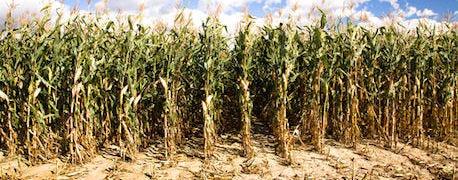October 26, 2012

A report in the business journal Knowledge At Wharton from the University of Pennsylvania explained that though drought conditions are stabilizing in some areas, there will continue to be consequences and costs of the 2012 U.S. drought.
From food costs and farmer recovery to agribusiness impact, the effects of the drought will be remembered – somewhat fondly, for some industries like fertilizer and seed – not-so-fondly for farmers and ranchers.
Food prices seem to rise to the top of the concern list for many consumers, but Z. John Zhang, a Wharton professor of marketing, says in the journal that the real impact will be in countries that rely on U.S. imports.

UPenn's Wharton school weighs in on the costs and consequences of the 2012 U.S. drought
"'The United States is one of the biggest food producers in the world. This drought is not going to just impact the marketplace here; it's also going to hit in China, Africa, everywhere,'" Zhang says. "'You can certainly imagine that the impact is going to be a lot bigger in developing countries than in the United States.'"
Though the USDA said food costs will go up, Zhang says there will be ways to mitigate the effects through consumer behavior – perhaps replacing more expensive food items for less expensive ones.
For grain farmers, lower yields and higher grain prices coupled with crop insurance made marketing decisions a tangled web.
Another journal commentator, Mitch Kasper, principal at Midwest AG Investors in Chicago, says farmers can handle one drought year, but the real pocketbook problems will appear if another drought or weather problem shows up next year – back-to-back years of low production could cause many farmers to "feel the pain," he says.
But effects of the drought seep deeper into regional infrastructure. The journal article points out that grain elevator operations suffer because there is little opportunity to absorb lost revenue from smaller crops. Trucking and railroad companies that haul grain are also impacted.
Despite the seemingly endless list of negative impacts, some companies may experience a boon in a drought year. Seed companies selling top genetics, traditional seed companies and fertilizer providers are projected to remain viable.
Kasper says farmers are showing optimism for next year by locking in prices for some of their 2013 crop. Even if next year's crop is just average, demand could facilitate a banner year.
"'If the futures prices were lower, that would really be discouraging for operators,'" he adds in a statement to the journal. "'That's basically saying the demand for the product isn't there. But the futures market is telling you that the demand is definitely there.'"
Read more here.
You May Also Like




